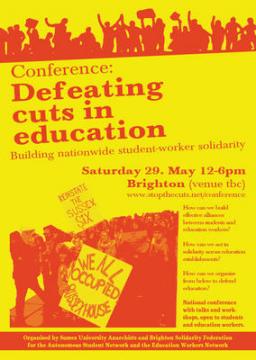THIS Saturday (29th May), 12pm – 6pm in Brighton. Join the Facebook event. Venue to be confirmed very soon here and on Facebook.
As a new government is getting ready to attack the living conditions of ordinary people, students and education workers have already had experiences with cuts – and how we can stop them. We will try to draw the lessons from the strikes, occupations and other forms of direct action taken in HE and FE over the last months. How can we build effective alliances between students and workers? How can we act in solidarity across education establishments? How can we organise from below to defend education?
National conference with talks and workshops, open to students and education workers.
Organised by Anarchist Society and Brighton Solidarity Federation for the Autonomous Students Network and the Education Workers Network.
http://www.stopthecuts.net/conference
For more information, contact education.cuts.conference [at] googlemail.com
***************
Introductory session:
- Reports from local anti-cuts campaigns
- EWN and ASN speakers
- General discussion
Lunch
Workshops (A) practical focus:
- Propaganda/graphics and layout/campaign websites
- How to occupy : practical barricading
Workshops (B) focus on organising:
- Organising with trade unions – from student perspective
- Organising with trade unions – from worker perspective
- Keeping campaigns democratic / meetings workshop
Workshops (C) strategy & analysis:
- What is direct action?
- Communication and massification : from activist group to movement
- Organising as an industrial network
Plenary discussion

Comments
From a London education
Fighting cuts is only part of the struggle...
We could become far more productive within 10 years with some serious investment in green energy. Hence very dumb to reduce incentives for people to fit solar panels for example, or to complain about wind turbines spoiling the view.
I was an engineering student around twenty years ago - already sandwich course placements in London were becoming hard to find. This was partly because of industrial deskilling being rampant in the cause of competitiveness - whereas pride in skillful work is of course essential unless you want to produce crap. Margaret Thatcher failed abysmally to see that her policies would throw out the proverbial baby with the bathwater, and yes many unions fought their corner pretty badly. We have never had a culture here where management is a career progression for shop-floor workers who actually know how to do the job better than their bosses. We are class-ridden into shortsightedness and short-termism.
A huge part of the problem is the decline in craft-based education. I have taught the new 'Design and Technology' curriculum, and it is a model with deeply flawed methodology. When I was at school we had subjects like metalwork, woodwork, technical drawing, sewing and pottery, where you could learn the proper way to use tools and materials to make things without pretension. Now everything is project based and pupils are expected to design stuff before learning enough about the manufacturing process. Teachers then have to accomodate various mixed projects without ever having enough time to teach the necessary basic skills - resulting in the 'Design a Pizza' tendency. Deeply unsatisfying. I was also a tutor at an FE College and saw the sad development of easy-pass NVQ courses - a high pass rate meant more funding and no one seemed to care what this was spent on.
Further up the spectrum, Electronic Engineering courses, which could be an opportunity to get into the guts of new technology, are increasingly devoted to memorising internet protocols. How are we going to be any more than followers in the field at this rate? We have lost the Polytecnics, which were often innovative, in the race for false prestige University status. There are far fewer women studying engineering nowadays, incidentally, and this is a tragedy.
Another huge problem is the property market, tied to planning policies, which are still prioritising land for retail and high-rise flats despite the obvious long-term bankruptcy of this kind of speculation. Small manufacturers are literally forced out of business by punitive rents and redevelopment of working industrial units in trendy areas thanks to the 'artistic' culture boom.
I would like to see some of these issues grappled with by the students, occupiers and trade unionists who are starting to get together in opposition to rampant economic lunacy. This is where we need to move on to from exposing the bankers' greed and politicians' cronyism. There is a plan to set up a college to run City and Guilds type craft courses near me - local Councils can see this is a way forward where the government seems gripped by paralysis. I actually think we need fewer University places - with a return of opportunities for people to continue learning when they feel motivated rather than as an alternative to starting a Mcjob as soon as they leave school.